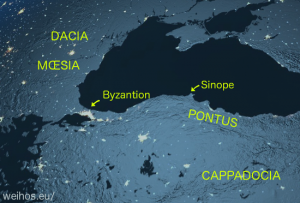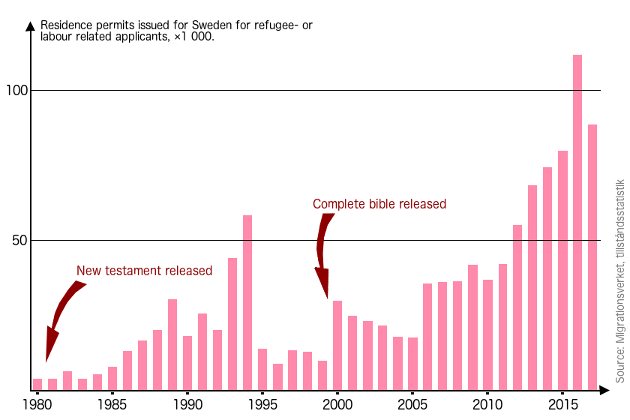Let us compare the handed down text of 1 Corinthians 14:31-40 with my reconstruction of the ausgangstext translated to English King James style, and a suggestion for how to render it in a modern bible!
| v. |
KJV |
Reconstruction |
Suggestion |
| 31 |
For ye may all prophesy one by one, that all may learn, and all may be comforted. |
For ye may all prophesy one by one, that all may learn, and all may be comforted. |
For ye may all prophesy one by one, that all may learn, and all may be comforted. |
| 32 |
And the spirits of the prophets are subject to the prophets. |
And the spirits of the prophets are subject to the prophets. |
And the spirits of the prophets are subject to the prophets. |
| 33 |
For God is not the author of confusion, but of peace, as in all churches of the saints. |
For God is not the author of confusion, but of peace, as in all churches of the saints. |
For God is not the author of confusion, but of peace, as in all congregations of the saints. |
| 34 |
Let your women keep silence in the churches: for it is not permitted unto them to speak; but they are commanded to be under obedience, as also saith the law. |
— |
— |
| 35 |
And if they will learn any thing, let them ask their husbands at home: for it is a shame for women to speak in the church. |
— |
— |
| 36 |
What? came the word of God out from you? or came it unto you only? |
What? came the word of God out from you? or came it unto you only? |
What? came the word of God out from you? or came it unto you only? |
| 37 |
If any man think himself to be a prophet, or spiritual, let him acknowledge that the things that I write unto you are the commandments of the Lord. |
If any man think himself to be a prophet, or spiritual, let him acknowledge that the things that I write unto you are the commandments of the Lord. |
If any man think himself to be a prophet, or spiritual, let him acknowledge that the things that I write unto you are the commandments of the Lord. |
| 38 |
But if any man be ignorant, let him be ignorant. |
But if any man be ignorant, let him be ignorant. |
But if any man be ignorant, let him be ignorant. |
| 39 |
Wherefore, brethren, covet to prophesy, and forbid not to speak with tongues. |
Wherefore, brethren, covet to prophesy, and forbid not to speak with tongues. |
Wherefore, brethren, covet to prophesy, and forbid not to speak with tongues. |
| 40 |
Let all things be done decently and in order. |
Let all things be done decently and in order. |
Let all things be done decently and in order. |
| 41 |
— |
— |
[Let the women keep silence in congregation: for it is not permitted unto them to speak; but they are commanded to be under obedience, as also saith the law. |
| 42 |
— |
— |
And if they will learn any thing, let them ask their husbands at home: for it is a shame for women to speak in congregation.] |
The verses 34-35 exist in all manuscripts, however in the Book of Armagh (ca year 808) and in Codex Claromontanus (mid 5th century), they appear at the end of chapter 14. These two are also supported by Ambrosiaster’s commentary. How do I know?
A grant from the European Union enabled Brill to release for free a digital copy of a collation of Old Latin witnesses to Paul’s letters. You can download it here.
The word that KJV translated “church” is Greek εκκλησια. Liddel & Scott’s dictionary says:
An assembly of the citizens summoned by the crier, the legislative assembly: at Athens, the ordinary assemblies were called κύριαι ἐκκλησίαι, four in each πρυντανεία […]
The word εκκλησια can mean church, but doesn’t necessarily refer to a Christian congregation, so translating it with ‘church’ in 1 Cor 14:34 involves some unnecessary speculation.
At the end of the verse we read: “… as also saith the law.” When “the law” is mentioned in Paul’s letters it is usually understood to mean the Mosaic law. However, in this case it becomes farfetched to try to find something in the Mosaic law that forbids women from speaking in assemblies. It would also be anachronistic to try anhave this bronze-age law collection talk about Christian churches.
The Greek-English lexicon BDAG provides some pointers that may be relevant. Under headword λαλέω, it mentions in connection with 1 Corinthians 14:34, Plutharch’s Moralia 142 D, which reads:
Τὴν Ἠλείων ὁ φειδίας Ἀφροδίτην ἐποίησε χελώνην πατοῦσαν,
οἰκουρίας σύμβολον ταῖς γυναιξὶ καὶ σιωπῆς.
Δεῖ γὰρ ἢ πρὸς τὸν ἂνδρα λαλεῖν ἢ διὰ τοῦ ἀνδρος,
μὴ δυσχεραίνουσαν εἰ δι ἀλλοτρίας γλώσσης ὥσπερ αὐλητὴς φθέγγεται σεμνότερον.
— Moralia 142 D.
They also reference Inscriptiones Graecae 1369, so let’s quote it as well:
Α Γ Λ Α Υ Ρ Ο Υ Ι Ε Ρ Ε Α Φ Ε Ι Δ Ο Σ Τ Ρ Α Τ Η
Ε Τ Ε Ο Κ Λ Ε Ο Υ Σ Α Ι Θ Α Λ Ι Δ Ο Υ Θ Υ Γ Α Τ Η Ρ
… normalised …
Ἀγλαύρου ἱέρα Φειδοστράτη
Ἐτεοκλέους Αιθαλίδου θυγάτηρ.
It is considered bad practice to omit a portion of text from a bible if that text is in all manuscripts, even if we believe it is not original. In this case, verses 34-35 may have been original in their position at the end of chapter 14, or they may originate in the very first letter that Paul sent to the Corinthians, for he had addressed them previously (1 Cor 5:9). If so, it becomes easy to understand why Paul doesn’t provide us with context to his advice or specify which law he refers to, since his first letter wasn’t intended to circulate as scripture.






